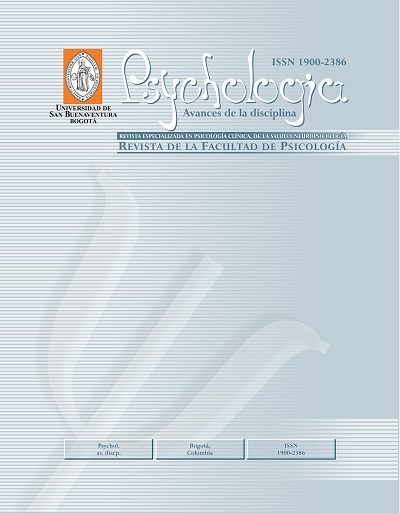View/Download
How to Cite
Helena Londoño, N., Agudelo, D., Martínez, E., Anguila, D., Aguirre, D., & Mogollón, C. (2017). Cuestionario de efectividad de la psicoterapia Outcome Questionnaire. Validación en muestra clínica colombiana. Psychologia, 11(1), 97–108. https://doi.org/10.21500/19002386.3105
More Citation Formats
License terms
▼
This journal provides open, immediate access to its contents, based on the principle that offering the public free access to research helps to promote a higher global exchange of knowledge.
As such, all journal articles are published under a Creative Commons Attribution-NonCommercial-ShareAlike 4.0 International License (CC BY-NC-SA), by which commercial use of the original work or its possible derived works is not allowed, and the distribution thereof must be done with the same license elements regulating the original work.
http://creativecommons.org/licenses/by-nc-sa/4.0/
Abstract
Establecer las propiedades estructurales y psicométricas del OQ-45.2 e identificar la sensibilidad al cambio y diferencias según género. Método: se realizó en población clínica, participaron 214 consultantes (111 hombres y 103 mujeres), Instrumento: Outcome Questionnaire (OQ-45.2). Resultados: El AFC mostró índices de bondad de ajuste bajos y valor de RMSEA de 0.071. Se recomendó realizar el AFE, y esta estructura incluyó 20 ítems y explicó el 58,8 % de la varianza total: preocupación, problemas del desempeño del rol social, insatisfacción global, alcohol/drogas, dificultades en las relaciones e insatisfacción en las relaciones afectivas. Para la escala original, los coeficientes se encontraron entre 0.52 y 0.92; no se presentaron diferencias según género en ninguno de los factores pero sí sensibilidad al cambio en la terapia en todas las dimensiones. Para la estructura encontrada a través del AFE con 20 ítems, los coeficientes se encontraron entre 0.47 y 0.75. Los índices de ajustes para esta nueva estructura fueron muy favorables (CFI=0,920, TLI=0,902 y NFI=0,790) y valor de RMSEA de 0.046. Se reportaron diferencias con relación al género en las dimensiones Insatisfacción global (más elevadas en mujeres) y Alcohol/droga (puntuaciones más elevadas en hombre). La prueba reportó sensibilidad al cambio en la escala original en Estrés, Desempeño y Relaciones interpersonales negativas, y en la escala abreviada en Preocupación, Problemas del rol social e Insatisfacción en las relaciones afectivas. Conclusiones: el OQ 45.2 no presentó una estructura adecuada a través del AFC. El AFE reportó 6 factores y 20 ítems, adecuados índices de ajustes, pero no todos los factores con buen nivel de confiabilidad.
References
Amble, I., Gude, T., Stubdal, S., Oktedalen, T., Skjorten, A. M., Andersen, B. J. & Wampold, B. E. (2014). Psychometric properties of the Outcome Questionnaire-45.2: The Norwegian version in an international context. Psychotherapy Research, 24(4), 504-513.
Bechstead, D.J., Hatch, A.L., Lambert, M.J., Eggett, D.L., Goates, M.K., & Vermeersch, D.A. (2003). Clinical significance of the outcome questionnaire (OQ-45.2). The behavior analyst today, 4(1), 86-97.
Bergen, A. & Parra, G. (2002). OQ-45.2, cuestionario para evaluación de resultados y evolución en psicoterapia: adaptación, validación e indicaciones para aplicación e interpretación. Terapia psicológica, 20(2), 161-176.
Blais, M. A., Malone, J. C., Stein, M. B., Slavin-Mulford, J., O'Keefe, S. M., Renna, M., & Sinclair, S. J. (2013). Treatment as usual (TAU) for depression: a comparison of psychotherapy, pharmacotherapy, and combined treatment at a large academic medical center. Psychotherapy, 50(1), 110.
Boswell, D., White, J., Sims, W., Harrist, S. & Romans, J. (2013). Reliability and validity of the Outcome Questionnaire-45.2. Psychological Reports: Mental and Physuical Health: 112, 1-10.
Burlingame, G., Gleave, R., Erekson, D., Nelson, P., Olsen, J., Thayer, S. & Beecher, M. (2015). Differential effectiveness of group, individual and conjoint treatments: an archival analysis of OQ-45 change trajectories. Psychotherapy Research, DOI 10.1080/10503307.2015.1044583.
Chiappelli, M., Lo Coco, G., Gullo, S., Bensi, l., & Prestano, C. (2008). The Outcome Questionnaire 45.2. Italian validation of an instrument for the assessment of phychological treatments. Epidemiologia e Psichiatria sociale, 17(2), 152-161.
Connolly, M., Kurtz, J., Thompson, D., Mack, R., Lee, J. Eisen, S., Gallop, R., & Crits-Christoph, P. (2015). The Effectiveness of clinician feedback in the treatment of depression in the community mental health system. Journal of Consulting and Clinical Psychology, 83, 748-759.
Correa D., Florenzano, R., & Rojas, P. (2006). El uso del cuestionario OQ-45.2 como indicador de psicopatología y de mejoría en pacientes psiquiátricos hospitalizados. Revista Chilena de Neuro-Psiquiatría, 44(4), 258-262.
De la Parra, G. & Von Bergen, G. (2006). Medición de los resultados en psicoterapia: uso del OQ.45.2, un instrumento validado en Chile. Revista GU, 2(2), 2008-222.
Flynn R., Aubry T., Guindon S., & Tardif I. (2002). Validation d’une Version Française du Outcome Questionnaire et Évaluation d’un Service de Counselling en Milieu Clinique. The Canadian Journal of Program Evaluation Vol. 17 No. 3 Pages 57–74 versión On-Line. En http://www.evaluationcanada.ca/secure/17-3-057.pdf
Garrido, L., Santelices, M.P., & Pierrehumbert, B. (2009). Validación chilena del cuestionario de evaluación de apego en el adulto CAMIE. Revista latinoamericana de psicología. 41(1), 81-98.
Gross, R., Glasser, S., Elisha, D., Tishby, O., Madar, J. D., Levitan, G., & Lambert, M. J. (2014). Validation of the Hebrew and Arabic Versions of the Outcome Questionnaire (OQ-45). The Israel journal of psychiatry and related sciences, 52(1), 33-39.
Gullo, S., Lo Coco, G., & Gelso, Ch. (2012). Early and later predictors of outcome in bief therapy: the role of real relationship. Journal of Clinical Psychology, 68, 614-619.
Holt, H., Beutler, L., Kinpara, S., Macías, S., Haug, S., Shiloff, N., Goldblum, P., Temkin, R. & Stein, M. (2015). Evidence-based Supervision Tracking Outcome and Teaching Principles of change in Clinical supervision to bring science to integrative practice. Psycyhotherapy, 52, 185-189.
Jong, K., Nugter, M.A., Polak, M.G., Wagenhorg, J.E., Spinhoven, P., & Heiser, W.J. (2007). The Outcome Questionnaire (OQ-45) in a Dutch population: A cross-cultural validation. Clinical Psychology & Psychotherapy, 14(4), 288-301.
Lambert, M. (2015). Outcome Research: methods for improving outcome in routine care. En: O, Gelo; A. Pritz, & B. Rieken. Psychotherapy Research: Foundations, process and outcome. Viena: Springer Verlang.
Lambert, M.J., Lunnen, K., Umphress, V., Hansen, N.B. & Burlingame, G.M. (1996). Administration and scoring manual for the Outcome Questionnaire (OQ – 45.1) Salt Lake: IHC Center for Behavioral Health Care Efficacy.
Lara, C., Cruz, C., Vacarezza, A., Florenzano, R., & Trapp, A. (2008) Análisis comparativo de dos instrumentos de evaluación clínica: OQ-45 e InterRAI- Salud Mental Chile, versión On-line. En http://www.scielo.cl/scielo.php?script=sci_arttext&pid=S0717-92272008000300004
Machado, P. P., & Fassnacht, D. B. (2014). The Portuguese version of the Outcome Questionnaire (OQ‐45): Normative data, reliability, and clinical significance cut‐offs scores. Psychology and Psychotherapy: Theory, Research and Practice. 88(4):427-37.
Meyer, G.J., Finn, S.E., Eyde, L.D., Kay, G.G., Moreland, K.L., Dies, R.R., Eximan, E.J., Kubiszyn, T.W, & Reed, G.M. (2001). Psychological Testing and Psychological Assessmet: A review of Evidence and Issues. American Psychologist, 53(2), 128-165.
Miller, S,D., Duncan, B.L., Brown, J., Sparks, J.A., & Claud, D.A. (2003). The Outcome rating scale: a priliminay study of the reliability, validity, and feasibility of a Brief visual Anolog Measures. Journal of Brief Therapy, 2(2), 91-100.
Painepán B. & Kühne W. (2012). Efectividad según duración de la psicoterapia en un centro de atención psicológica para universitarios. Departamento de Promoción de la Salud Psicológica. Universidad de Santiago de Chile. On-Line en http://www.kuhne.cl/documentos/efectividad-segun-duracion-de-la-psicoterapia.pdf
Santibáñez, P.M., Román, M.F., & Vinet, E.V. (2009). Efectividad de la psicoterapia y su relación con la alianza terapéutica. Interdisciplinaria, 26, versión On-Line. En http://www.scielo.org.ar/scielo.php?script=sci_arttext&pid=S1668-70272009000200006, consultado el 1 de Diciembre del 2015.
Shulte, D. (1977). Dimensions of outcome measurement. En H.H. Strupp: L.M. Horowitz y M.J. Lambert (Ed.). Measuring patient changes in mood, anxiety and personality disorders: Towards a core battery. Whashington: APA.
Takara, R., Beecher, M. E., Okiishi, J. C., Shimokawa, K., Lambert, M. J., & Griner, D. (2015). Translation of the Outcome Questionnaire-45 (OQ) into Japanese: A cultural adaptation. Psychotherapy Research, 11, 1-13. DOI: 10.1080/10503307.2015.1080876
Timman, R., Jong, K., & Neve‐Enthoven, N. (2015). Cut‐off Scores and Clinical Change Indices for the Dutch Outcome Questionnaire (OQ‐45) in a Large Sample of Normal and Several Psychotherapeutic Populations. Clinical psychology & psychotherapy. doi: 10.1002/c In Press.
Bechstead, D.J., Hatch, A.L., Lambert, M.J., Eggett, D.L., Goates, M.K., & Vermeersch, D.A. (2003). Clinical significance of the outcome questionnaire (OQ-45.2). The behavior analyst today, 4(1), 86-97.
Bergen, A. & Parra, G. (2002). OQ-45.2, cuestionario para evaluación de resultados y evolución en psicoterapia: adaptación, validación e indicaciones para aplicación e interpretación. Terapia psicológica, 20(2), 161-176.
Blais, M. A., Malone, J. C., Stein, M. B., Slavin-Mulford, J., O'Keefe, S. M., Renna, M., & Sinclair, S. J. (2013). Treatment as usual (TAU) for depression: a comparison of psychotherapy, pharmacotherapy, and combined treatment at a large academic medical center. Psychotherapy, 50(1), 110.
Boswell, D., White, J., Sims, W., Harrist, S. & Romans, J. (2013). Reliability and validity of the Outcome Questionnaire-45.2. Psychological Reports: Mental and Physuical Health: 112, 1-10.
Burlingame, G., Gleave, R., Erekson, D., Nelson, P., Olsen, J., Thayer, S. & Beecher, M. (2015). Differential effectiveness of group, individual and conjoint treatments: an archival analysis of OQ-45 change trajectories. Psychotherapy Research, DOI 10.1080/10503307.2015.1044583.
Chiappelli, M., Lo Coco, G., Gullo, S., Bensi, l., & Prestano, C. (2008). The Outcome Questionnaire 45.2. Italian validation of an instrument for the assessment of phychological treatments. Epidemiologia e Psichiatria sociale, 17(2), 152-161.
Connolly, M., Kurtz, J., Thompson, D., Mack, R., Lee, J. Eisen, S., Gallop, R., & Crits-Christoph, P. (2015). The Effectiveness of clinician feedback in the treatment of depression in the community mental health system. Journal of Consulting and Clinical Psychology, 83, 748-759.
Correa D., Florenzano, R., & Rojas, P. (2006). El uso del cuestionario OQ-45.2 como indicador de psicopatología y de mejoría en pacientes psiquiátricos hospitalizados. Revista Chilena de Neuro-Psiquiatría, 44(4), 258-262.
De la Parra, G. & Von Bergen, G. (2006). Medición de los resultados en psicoterapia: uso del OQ.45.2, un instrumento validado en Chile. Revista GU, 2(2), 2008-222.
Flynn R., Aubry T., Guindon S., & Tardif I. (2002). Validation d’une Version Française du Outcome Questionnaire et Évaluation d’un Service de Counselling en Milieu Clinique. The Canadian Journal of Program Evaluation Vol. 17 No. 3 Pages 57–74 versión On-Line. En http://www.evaluationcanada.ca/secure/17-3-057.pdf
Garrido, L., Santelices, M.P., & Pierrehumbert, B. (2009). Validación chilena del cuestionario de evaluación de apego en el adulto CAMIE. Revista latinoamericana de psicología. 41(1), 81-98.
Gross, R., Glasser, S., Elisha, D., Tishby, O., Madar, J. D., Levitan, G., & Lambert, M. J. (2014). Validation of the Hebrew and Arabic Versions of the Outcome Questionnaire (OQ-45). The Israel journal of psychiatry and related sciences, 52(1), 33-39.
Gullo, S., Lo Coco, G., & Gelso, Ch. (2012). Early and later predictors of outcome in bief therapy: the role of real relationship. Journal of Clinical Psychology, 68, 614-619.
Holt, H., Beutler, L., Kinpara, S., Macías, S., Haug, S., Shiloff, N., Goldblum, P., Temkin, R. & Stein, M. (2015). Evidence-based Supervision Tracking Outcome and Teaching Principles of change in Clinical supervision to bring science to integrative practice. Psycyhotherapy, 52, 185-189.
Jong, K., Nugter, M.A., Polak, M.G., Wagenhorg, J.E., Spinhoven, P., & Heiser, W.J. (2007). The Outcome Questionnaire (OQ-45) in a Dutch population: A cross-cultural validation. Clinical Psychology & Psychotherapy, 14(4), 288-301.
Lambert, M. (2015). Outcome Research: methods for improving outcome in routine care. En: O, Gelo; A. Pritz, & B. Rieken. Psychotherapy Research: Foundations, process and outcome. Viena: Springer Verlang.
Lambert, M.J., Lunnen, K., Umphress, V., Hansen, N.B. & Burlingame, G.M. (1996). Administration and scoring manual for the Outcome Questionnaire (OQ – 45.1) Salt Lake: IHC Center for Behavioral Health Care Efficacy.
Lara, C., Cruz, C., Vacarezza, A., Florenzano, R., & Trapp, A. (2008) Análisis comparativo de dos instrumentos de evaluación clínica: OQ-45 e InterRAI- Salud Mental Chile, versión On-line. En http://www.scielo.cl/scielo.php?script=sci_arttext&pid=S0717-92272008000300004
Machado, P. P., & Fassnacht, D. B. (2014). The Portuguese version of the Outcome Questionnaire (OQ‐45): Normative data, reliability, and clinical significance cut‐offs scores. Psychology and Psychotherapy: Theory, Research and Practice. 88(4):427-37.
Meyer, G.J., Finn, S.E., Eyde, L.D., Kay, G.G., Moreland, K.L., Dies, R.R., Eximan, E.J., Kubiszyn, T.W, & Reed, G.M. (2001). Psychological Testing and Psychological Assessmet: A review of Evidence and Issues. American Psychologist, 53(2), 128-165.
Miller, S,D., Duncan, B.L., Brown, J., Sparks, J.A., & Claud, D.A. (2003). The Outcome rating scale: a priliminay study of the reliability, validity, and feasibility of a Brief visual Anolog Measures. Journal of Brief Therapy, 2(2), 91-100.
Painepán B. & Kühne W. (2012). Efectividad según duración de la psicoterapia en un centro de atención psicológica para universitarios. Departamento de Promoción de la Salud Psicológica. Universidad de Santiago de Chile. On-Line en http://www.kuhne.cl/documentos/efectividad-segun-duracion-de-la-psicoterapia.pdf
Santibáñez, P.M., Román, M.F., & Vinet, E.V. (2009). Efectividad de la psicoterapia y su relación con la alianza terapéutica. Interdisciplinaria, 26, versión On-Line. En http://www.scielo.org.ar/scielo.php?script=sci_arttext&pid=S1668-70272009000200006, consultado el 1 de Diciembre del 2015.
Shulte, D. (1977). Dimensions of outcome measurement. En H.H. Strupp: L.M. Horowitz y M.J. Lambert (Ed.). Measuring patient changes in mood, anxiety and personality disorders: Towards a core battery. Whashington: APA.
Takara, R., Beecher, M. E., Okiishi, J. C., Shimokawa, K., Lambert, M. J., & Griner, D. (2015). Translation of the Outcome Questionnaire-45 (OQ) into Japanese: A cultural adaptation. Psychotherapy Research, 11, 1-13. DOI: 10.1080/10503307.2015.1080876
Timman, R., Jong, K., & Neve‐Enthoven, N. (2015). Cut‐off Scores and Clinical Change Indices for the Dutch Outcome Questionnaire (OQ‐45) in a Large Sample of Normal and Several Psychotherapeutic Populations. Clinical psychology & psychotherapy. doi: 10.1002/c In Press.
Downloads
Download data is not yet available.





















